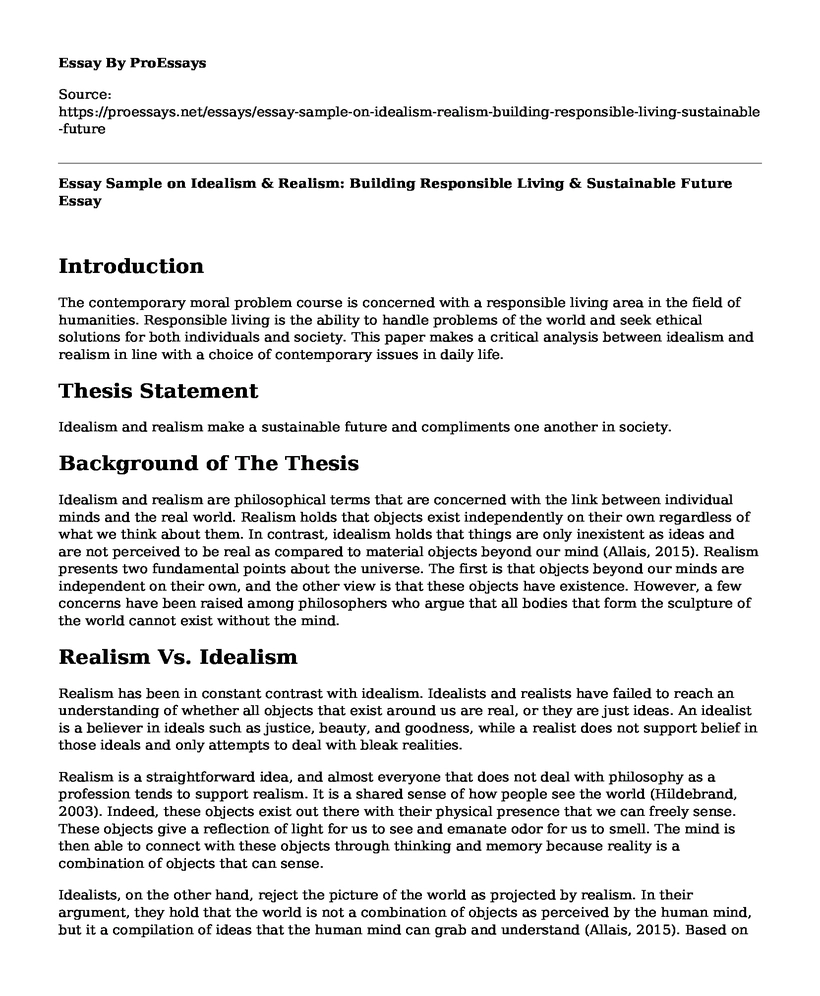Introduction
The contemporary moral problem course is concerned with a responsible living area in the field of humanities. Responsible living is the ability to handle problems of the world and seek ethical solutions for both individuals and society. This paper makes a critical analysis between idealism and realism in line with a choice of contemporary issues in daily life.
Thesis Statement
Idealism and realism make a sustainable future and compliments one another in society.
Background of The Thesis
Idealism and realism are philosophical terms that are concerned with the link between individual minds and the real world. Realism holds that objects exist independently on their own regardless of what we think about them. In contrast, idealism holds that things are only inexistent as ideas and are not perceived to be real as compared to material objects beyond our mind (Allais, 2015). Realism presents two fundamental points about the universe. The first is that objects beyond our minds are independent on their own, and the other view is that these objects have existence. However, a few concerns have been raised among philosophers who argue that all bodies that form the sculpture of the world cannot exist without the mind.
Realism Vs. Idealism
Realism has been in constant contrast with idealism. Idealists and realists have failed to reach an understanding of whether all objects that exist around us are real, or they are just ideas. An idealist is a believer in ideals such as justice, beauty, and goodness, while a realist does not support belief in those ideals and only attempts to deal with bleak realities.
Realism is a straightforward idea, and almost everyone that does not deal with philosophy as a profession tends to support realism. It is a shared sense of how people see the world (Hildebrand, 2003). Indeed, these objects exist out there with their physical presence that we can freely sense. These objects give a reflection of light for us to see and emanate odor for us to smell. The mind is then able to connect with these objects through thinking and memory because reality is a combination of objects that can sense.
Idealists, on the other hand, reject the picture of the world as projected by realism. In their argument, they hold that the world is not a combination of objects as perceived by the human mind, but it a compilation of ideas that the human mind can grab and understand (Allais, 2015). Based on their understanding, all physical objects are just a form of physical clothing covering the idea. Some idealists imply that material objects do not exist at all because the world is made up of perception of physical objects. However, all idealists agree that the universe is made up of ideas but disagree whether these ideas form a section of the universal mind while others believe it is a section of the individual mind.
The difference between idealism and realism is not black and white as perceived because most scholars have been caught in between the discussion. Idealist has shared that perception is highly determined by the mind, and this means that ideas will always affect our thoughts as human beings (Hildebrand, 2003). And this is the only point where idealists and realists have reached a common ground. Therefore, the struggle to separate idealism and realism is futile, and all scholars should find ways through which the two parties work together towards making the world a better place for all.
References
Allais, L. (2015). Manifest Reality: Kant's idealism and his realism. Oxford, United Kingdom: Oxford University Press. Doi: 10.1515/agph-2016-0023
Hildebrand, D. (2003). Beyond realism and antirealism: John Dewey and the neopragmatists. Nashville, Tenn.: Vanderbilt University Press. Retrieved from https://www.researchgate.net/publication/292317939_Beyond_realism_and_antirealism_John_Dewey_and_the_neopragmatists
Cite this page
Essay Sample on Idealism & Realism: Building Responsible Living & Sustainable Future. (2023, May 09). Retrieved from https://proessays.net/essays/essay-sample-on-idealism-realism-building-responsible-living-sustainable-future
If you are the original author of this essay and no longer wish to have it published on the ProEssays website, please click below to request its removal:
- Descartes Arguments Concerning the Body and Soul Essay
- Animal Bush Meat and Ethics Essay Example
- Paper Example on Rachel Dolezal's Identity and Culture
- Bioethics: A Global Concern for Human Beliefs & Values - Essay Sample
- Bridging Gaps, Fostering Maturity, and Building Meaningful Relationships in Organizations - Paper Sample
- Oculus Virtual Reality and Ethical Issues - Report Sample
- Code of Ethics and Political Perspectives - Essay Sample







